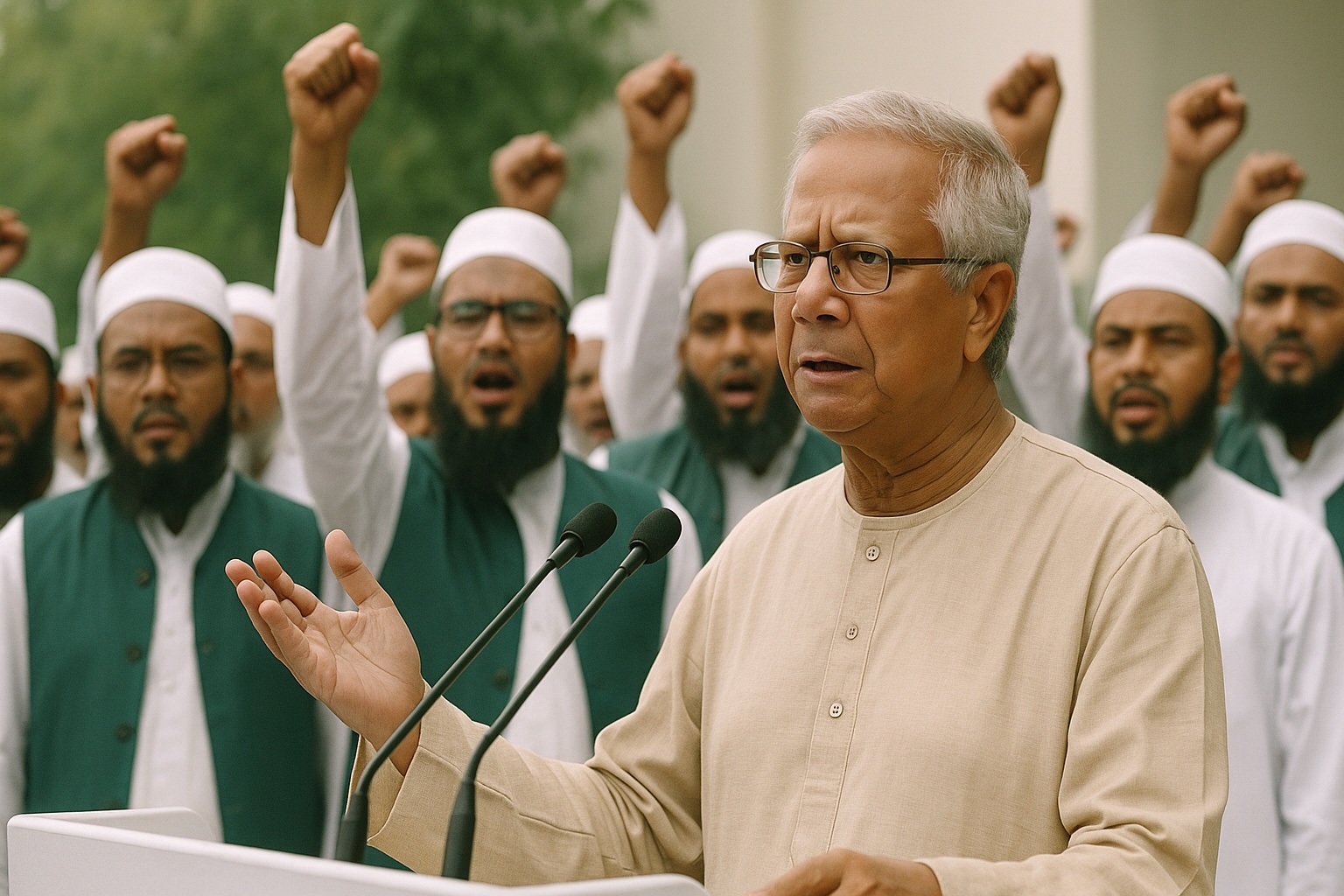Beleaguered in Bangladesh: Mohammed Yunus woos Islamic fundamentalists

Faced with mounting opposition, Chief Advisor of Interim Government in Bangladesh Mohammed Yunus is seeking an escape route by wooing the Islamic fundamentalists. The ban imposed by the Sheikh Hasina government on the fundamentalist Jamaat-e-Islami has been lifted and its registration restored. Awami League, former Prime Minister Sheikh Hasina’s party with a secular agenda, has been banned.
Ignoring the demand of the army and Bangladesh Nationalist Party that the elections be held within this year, Yunus has announced that polls will be held in April next. This, observers believe, is a strategy of the Chief Advisor to allow the fundamentalist Jamaat-e-Islami and Nationalist Citizens Party time to consolidate their positions and his own position with the help of the fundamentalist forces. There is no certainty that the polls will be held in April.
While taking over as the head of the interim government last August, Mohammed Yunus had promised to carry out reforms in the administration, the judiciary, the election commission including the electoral system and reforms in the information flow system so as to ensure free and fair polls and the formation of an accountable political system. None of these promised reforms has yet been carried out. Yunus has realized that there is little chance of his returning to power as the head of the next government if elections are held now.
To consolidate his position, Mohammed Yunus is also trying to woo the Donald Trump government by offering to open a “humanitarian channel” through Bangladesh to deliver aid to the war-torn Rakhine region of Myanmar. As a balancing act, and to appease China, Yunus has gone overboard to woo Chinese presence in Bangladesh, at the expense of Indian interests. These moves have landed him in choppy weather, with a warning from the army chief of Bangladesh that the interim government should not overstep its brief.
At the beginning of April last National Security Advisor Khalilur Rahman revealed about discussions with the U.N. Secretary General regarding the opening of the “humanitarian channel” to the Rakhine region. The issue was taken up by UN under pressure from the U.S. It was not a straightforward humanitarian initiative on the part of the interim government. Rather, such a corridor will help Washington DC to send aid to the Arakan Army which is now fighting the military junta in Myanmar. The purpose is to disrupt the Kyaukphyu Port in Rakhine state that has been developed by China in partnership with the military junta as a part of the strategy of Beijing to reach the Bay of Bengal through Myanmar. The U.S. has extended support to the pro-democracy and anti-military junta forces in Myanmar as a part of its broader strategy to contain China in the Bay of Bengal region.
Realizing the risk of antagonizing China with the proposal of the Rakhine Corridor, Mohammed Yunus, on his visit to Beijing at the end of March, suggested that the Chinese government should establish an economic foothold in Bangladesh and leverage its strategic position as the “only guardian of the ocean” for the landlocked north-eastern region of India. Arguing mistakenly that the seven sisters in north-east India had no way to reach the ocean, he made the unwarranted comment that the north-east region could be “an extension of the Chinese economy” and that using Bangladesh as the springboard China could also access Nepal and Bhutan through the north-east.
Calling China “master of water management,” he also sought a 50-year master plan from Beijing for river water management and welcomed Chinese participation in the Teesta River Comprehensive Management and Restoration Project. Knowing fully well that Chinese presence in the Teesta basin in Bangladesh will undermine the security of the strategic Siliguri corridor of India. He also welcomed Chinese companies to participate in the modernization and expansion of the facilities at Mongla Port to which the Sheikh Hasina government had offered India access. China now plans to provide $400 million for the modernization of Mongla Port.
The move to discuss with the U.N. for the opening of the “Rakhine corridor” without consulting the army has irked Army Chief of Bangladesh General Waker-uz-Zaman because such a corridor may put Bangladesh in war with Myanmar. General Waker-uz-Zaman has issued a warning to Mohammed Yunus to hold the elections in Bangladesh within the current year and that a caretaker government is not empowered to take important policy decisions. Besides the Rakhine corridor, the move of Mohammed Yunus to woo Chinese presence in strategic areas in Bangladesh is also believed to be one of the reasons for the warning of the army chief.
Relations between Yunus and Army Chief has been deteriorating day by day & Army did not like the appointment of former diplomat Khalilur Rahman as the National Security Advisor of Bangladesh. The army suspects that Yunus had created this position to offset the control of the military over security affairs. The army also suspects that Yunus government is grooming Lt. General Kamrul Hassan (Principal Staff Officer of Armed Forces Division in Chief Adviser’s Office) as successor of General Waker-uz-Zaman.
With the Awami League banned under the Anti-Terrorism Act on May 10, the BNP too wants the elections to be held early; i.e. within this year. For, BNP’s main political rival is not present in the electoral battle now and the Nationalist Citizens Party, along with other contender for power, is not yet organizationally ready to face the polls. BNP and Jamaat-e-Islami, former allies, have parted company since.
The national standing committee of the BNP has said that people are “disappointed” with the announcement that the elections will be held in April 2026. Demanding that the elections be held within December 2025, the BNP has said that April will not be a suitable time for the holding of the polls because of Ramadan, secondary and higher secondary examinations and the possibility of summer storms.
To add to the problems of the Yunus, government employees in Bangladesh have been staging a nationwide protest against a new service law since the end of May that has threatened to paralyse the administration. The Public Service Amendment Ordinance allows for easier dismissals of officials for misconduct.
In the face of mounting discontent, Mohammed Yunus thus now has no way but to depend for political survival on Islamic fundamentalist parties Jamaat-e-Islami and Nationalist Citizens Party.




![From Kathmandu to the World: How Excel Students Are Winning Big [Admission Open]](https://nepalaaja.com/img/70194/medium/excel-college-info-eng-nep-2342.jpg)
